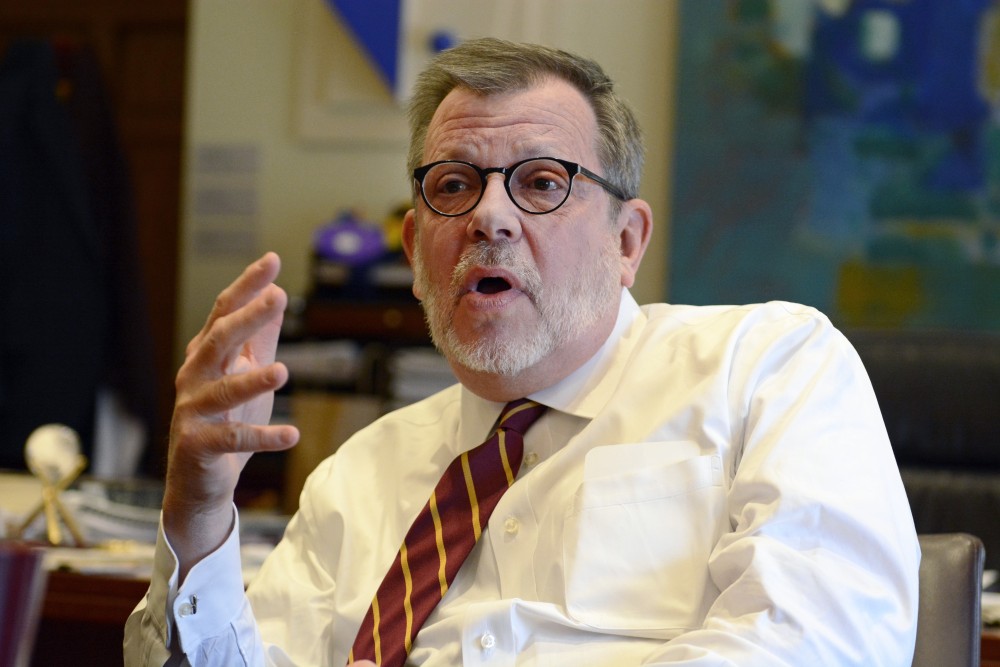The Minnesota Daily sat down with University President Eric Kaler in his office Wednesday for the March edition of Kickin’ It with Kaler.
Kaler discussed alleged recruiting violations by Gophers head football coach P.J. Fleck, sexual assault prevention and changing federal immigration policies.
Do you have any plans for spring break? Going to Cancun or anything?
I am going to watch the Gophers play basketball in D.C., so that will take me through Sunday. Got that down? Because they’re going to be in the final game. Prediction. Then we’ve got a little fundraising trip out west. And then I’m going to try hard to get to our first round basketball game. I’m a pretty big Gopher basketball fan.
Boynton’s 2015 College Student Health Survey found that 17 percent of University students worry about having enough money to buy food before it runs out. Does the school have any efforts planned to help with that?
I think the students have put together a food pantry, which is an important step … Boynton Health has the Student Nutrition Advocacy Collaborative, which is students who help other students shop and prepare meals. It’s a partnership with MSA and Nutritious U Food Pantry. Those are resources that are available, but we certainly want our students to have adequate nutrition and hopefully these resources will help people who need it.
A report commissioned by the Education Trust found that the University is among the worst schools in the nation for black students’ college completion, with a 23.8 percent graduation gap between white and black students. Is the University taking any steps to curb the gap? If so, what are they?
First off, that data is a little bit dated. The current, most recent gap is 17 percent, so it’s a pretty good improvement, but it’s still a gap that’s unacceptable … We do work on graduation rates for all our students, and it’s just not acceptable to have a gap, much less a gap as large as that one. It is a focus of advisers and faculty and financial aid offices to try to make sure we have resources to help all our students graduate in time.
Recently you mentioned that resident and non-resident students could see tuition hikes as early as next fall, but that those comments were preliminary and depended on the state’s response to the school’s budget request. Would the hikes come even if the Legislature met the University’s full $147.2 million budget request?
Any tuition adjustments that we make reflect the investment that the state makes in us. So until our state budget allocation is finalized, we won’t know what our tuition landscape is going to look like. We understand very well and desire greatly to minimize any tuition increases that we need to move forward.
So far there are none planned for next fall? It just depends on the state?
Well it depends on the state and it’s also relatively early in our budget process, and all of this ultimately goes to the Board of Regents for approval. So the March timeframe is a little early to be having that conversation about what we’ll need to do.
Both the University Student Senate and the University Senate passed a resolution calling for Aramark, the school’s food service provider, to be held accountable for business ethics concerns, a lack of dietary accommodations and poor quality, among others. What are your thoughts on the resolution?
I know that the students have been pushing on Aramark for a long time and they certainly are people who are upset with them. They’re not new concerns, but we will continue to work … Their contract is coming up in the not-too-distant future, and I expect them to be able to respond to our concerns.
Do you think that Aramark needs to answer for the issues raised in the resolution?
I do. Questions have been raised, and they need to provide an answer to them, for sure.
In your State of the University address, you said immigrant and undocumented students are an important part of our campus, and that the University will soon open a new Immigration Resource Center to help those affected by changing federal policies. Could you talk a little more about that?
That is a set of resources that we’re still, actually as we talk, are in the process of assembling … We’ll pull them together, [provide] some more coordination and a simple point of access for our immigrant students … Again, it’s one bit of evidence to our commitment to supporting and helping those students.
You also said in your State of the University speech that the University will increase efforts to combat sexual assault. What will those changes be and how can they help?
…Probably the most controversial is mandatory training for faculty and staff around sexual assault [and] sexual harassment … We need to work effectively to provide continued training and opportunities for learning beyond the first year … [sexual assault and harassment are] unwelcome and will be dealt with by our student conduct code or by the law in an appropriate way …
Despite recent criticism, you said the University’s Bias Response and Referral Network doesn’t infringe on free speech. Do you think it’s up to the University to define what is free speech and what is harmful speech?
I think we are asked all the time to define free speech, and I think the Constitution does a good job and the courts have defined free speech. And again, an external group looked at the network and determined that the network is not infringing on speech, so it’s not just our opinion, it’s been validated by an external group.
Editors’ note: this interview has been edited for clarity and length.








